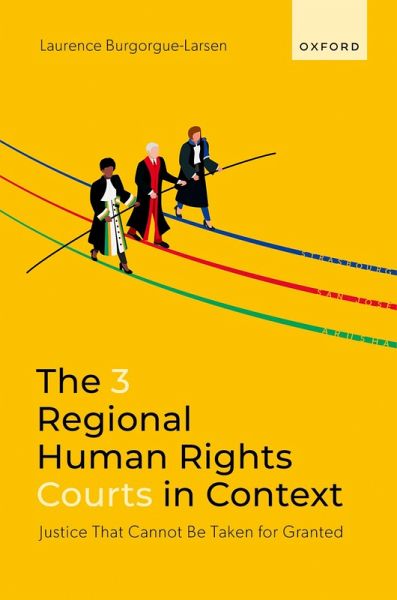
The 3 Regional Human Rights Courts in Context (eBook, ePUB)
Justice That Cannot Be Taken for Granted
Versandkostenfrei!
Sofort per Download lieferbar
96,95 €
inkl. MwSt.
Weitere Ausgaben:

PAYBACK Punkte
48 °P sammeln!
At specific moments in the history of Africa, Europe, and Latin America, each region decided to create supranational jurisdictions to protect human rights. These are, in chronological order, the European Court of Human Rights, the Inter-American Court of Human Rights, and the African Court on Human and Peoples' Rights. While each has been the subject of important, dedicated monographs, no major study has analysed both the institutional and jurisprudential issues of all three regional systems. The 3 Regional Human Rights Courts in Context: Justice That Cannot Be Taken for Granted is the first b...
At specific moments in the history of Africa, Europe, and Latin America, each region decided to create supranational jurisdictions to protect human rights. These are, in chronological order, the European Court of Human Rights, the Inter-American Court of Human Rights, and the African Court on Human and Peoples' Rights. While each has been the subject of important, dedicated monographs, no major study has analysed both the institutional and jurisprudential issues of all three regional systems. The 3 Regional Human Rights Courts in Context: Justice That Cannot Be Taken for Granted is the first book to offer a comprehensive comparison of the three systems. Rather than merely juxtaposing analogous features, the book considers how the three courts operate as parts of a greater, integrated whole. Similarities and differences between the courts are illuminated alongside historical, political, and sociological insights, in addition to the book's primary legal focus. Close analysis of the processes by which the courts came into being makes it clear that, regardless of distinct political, cultural, or other variances, states on each of the three continents have chafed against international supervision. The book also debunks the common belief that, after the Second World War, the thrust of human rights initiatives was so powerful that states no longer need to discuss them. Justice cannot be taken for granted--a position further supported by the book's analysis of how each court has evolved and how their rulings have been implemented. Laurence Burgorgue-Larsen's dynamism and multidisciplinary approach makes it possible to truly understand the stakes behind the institutional and jurisprudential developments of the three regional human rights courts. This is a book that will interest not only legal practitioners but also specialists in international relations, human rights, and countless other fields.
Dieser Download kann aus rechtlichen Gründen nur mit Rechnungsadresse in A, B, BG, CY, CZ, D, DK, EW, E, FIN, F, GR, HR, H, IRL, I, LT, L, LR, M, NL, PL, P, R, S, SLO, SK ausgeliefert werden.













